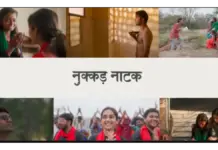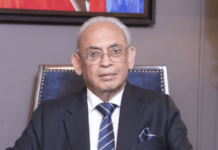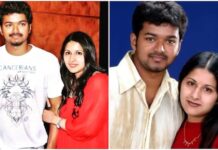Click https://bit.ly/komal327 if the above video does not autoplay.
Dharma Productions and Kaash Entertainment’s Shershaah (certified for 13+) is the biopic of Indian war hero Captain Vikram Batra who valiantly fought the Kargil War in 1999 and successfully defeated the Pakistanis. At a young age, Vikram laid down his life for the motherland in that war by leading from the front one of the toughest operations in mountain warfare in Indian history. He did not care for his life as his single-minded mission was to capture Point 4875 at Kargil, after successfully capturing Point 5140. It may be mentioned here that reaching Point 4875 was an almost impossible task but the Indian army bravehearts not only accomplished that but also defeated the Pakistanis in no time. Vikram Batra was decorated with the highest military honour, the Param Vir Chakra, for his valour.
Right from childhood, Vikram Batra wanted to be in the army. He had a twin brother and two sisters. Their parents were school teachers. While in college, Vikram fell in love with Dimple (Kiara Advani), a Sikh girl. Her father was against their decision to marry as Vikram was not a Sikh but a Punjabi. On the other hand, Vikram’s parents did not have any issues with the proposal. Even as the romance was blossoming, Vikram joined the Indian army and impressed his seniors with his daredevilry. Before the war between India and Pakistan started in 1999, Vikram had gone home to meet his family. He had also met Dimple and had secretly married her in the gurudwara. Promising to return soon and marry according to Hindu rites, Vikram had left for the war. It is in this war that he became a martyr but only after attaining victory.
The story, screenplay and dialogues are written by Sandeep Shrivastava. Since the story is based on the real life of Vikram Batra, which is interesting, little needs to be commented about that. However, it must be added that while it is interesting, all the facets of his life have not been presented well enough by the writer for the audience to feel the emotions. Neither are Vikram’s emotions and bonding with his family brought out well enough in the story nor is the love between Vikram and Dimple shown as being heartwarming enough. A couple of scenes do touch the heart but overall, the emotional quotient is far lower than what the story of the martyrdom of an Indian braveheart inherently affords. Sandeep Shrivastava’s screenplay could’ve been far better. The feeling of patriotism is evoked lesser than it should have. Of course, one does feel bad when Batra is killed in the war but one should’ve been crying inconsolably in that scene. Similarly, the enormity and danger of what turned out to be Vikram Batra’s final mission should have been underlined, perhaps, through a commentary or voice over. Everyone isn’t aware that climbing the rocky terrain to reach Point 4875, that too, when the Pakistanis were on the top with arms and ammunition, was an impossible task which India’s brave soldiers accomplished. Although the last about 40 minutes of the screenplay are replete with war scenes which are quite exciting, the feeling of patriotism is not too pronounced. Nor do the emotions in those scenes manifest themselves in the way they should have, for the best possible impact. Also, the screenplay appears scattered. Lots of points are raised but they’re not taken to their logical conclusions. For instance, Vikram tells one junior, who is grievously injured, not to worry as he would be alright after hospitalisation, but whether or how he becomes alright is not dwelt upon. Likewise, Vikram tells Subedar Bansi Lal Sharma (Anil Charanjeet) that he (Vikram) would contribute to the first fixed deposit for his (Bansi’s) new-born daughter as she was like a niece to him, but his investment in the FD is not shown after Bansi’s death. It is moments like the above which would’ve served a dual purpose — given the script and Vikram Batra’s character more gravitas and raised the emotional quotient of the script several notches higher. Special mention must be made of how the writer has shown the hearts of Vikram’s seniors changing slowly but surely. That’s good! Sandeep Shrivastava’s dialogues also lack in the patriotic jingoism which the Indian audience is so used to. Some dialogues are good but there needed to be at least 15 clapworthy dialogues in a script like this.
Sidharth Malhotra does a fair job as Vikram Batra and his twin brother, Vishal Batra. Although he looks very handsome, there’s nothing in his performance to make one believe that he (Vikram) is an armyman. Other actors, who’ve played armymen in the past, have probably essayed those roles to such perfection that Sidharth’s portrayal doesn’t seem like he has done something special to look and behave like a lieutenant first and a captain later. Kiara Advani gets limited scope but she does good justice to the character of Dimple, which she plays. She looks extremely pretty. Shiv Pandit is effective as Sanjeev Jamwal. Shataf Figar lends decent support as Lt. Col. Y.K. Joshi. Anil Charanjeet makes his presence amply felt as Subedar Bansi Lal Sharma. Sahil Vaid (as Sunny) is natural to the core but he hardly has anything to do. Pawan Chopra (as Vikram’s father) and Vijay Meenu (as Vikram’s mother) are adequate. Bijay J. Anand and Kirron Arya (as Dimple’s parents) lend fair support. Afnan Ashia has his moments as Arslaan. Zahoor Zaidi is realistic as Gafoor. Mir Sarwar does his part ably in the role of Haider. Sahil Rathod (as Afroz), David Browne (as Attaullah), Bobby Khanna (as Gen. Musharaf), Raaj Sungar (as Gen. Mehmood), Kapil Kumar (as Gen. Tariq Parvez) and Rajeev Bharadwaj (as Gen. Aziz Khan) lend good support. Krishnay Tuteja (as young Vikram Batra) and Kavay Tuteja (as young Vishal Batra) are very cute. Pranay Pachauri (as rifleman Yashpal), Atul Verma (as rifleman Meher Singh), Raj Arjun (as Subedar Raghunath), Abhiroy Singh (as Major Subrata Mukherjee), Jay Kartik (as lieutenant Naveen Nagappa), Nikitin Dheer (as Major Ajay Jasrotia), Himanshu Asho (as Capt. Rajeev Kapoor), Ankur Sharma (as Major Vikas Vohra), Trishaan (as Capt. Rajesh Adhau), Rakesh Dubey (as Major Bhaskar) and Manmeet Kaur (as Mona) provide the desired support. Rukmani Khanna and Ankita Goraya are alright as Vikram’s sisters.
Vishnu Varadhan’s direction is so-so. A far more sensitive handling of the script was needed to present the story of a young and supremely brave Indian armyman on the screen. After all, Vikram Batra was no ordinary Captain in the Indian army, he was of a rare breed, considering the way he fought the Pakistanis and laid down his life for the country. Musically, the ‘Raataan lambiyaan’ song (penned and composed by Tanishk Bagchi) is a wonderful and hit number. ‘Jaihind ki sena’ (lyrics Manoj Muntashir, music Vikram Montrose) and ‘Ranjha’ (lyrics Anvita Dutt, music Jasleen Royal) are also good numbers. The other songs — ‘Mann bharryaa’ (lyrics by Jaani, music by B. Praak and Jaani) and ‘Kabhi tumhe yaad’ (lyrics by Rashmi Virag, music by Javed-Mohsin) are fairly good. Song picturisations don’t deserve special mention. John Stewart Eduri’s background music is quite nice but should have been far more impactful to evoke emotions of various kinds. Kamaljeet Negi’s cinematography is excellent. Action and stunt scenes (Stefan Richter and Sunil Rodrigues) are well composed. Production designing (by Amit Ray and Subrata Chakraborty) and art direction (Avijit Ghosh and Vinayak Joshi) are of a good standard. A. Sreekar Prasad’s editing is okay.
On the whole, Shershaah is too ordinary to be remembered like the film’s subject, war hero Vikram Batra. Put differently, the film does not do justice to the memory of the braveheart. Had it released theatrically, it would not have fared well.
The film released today (12-8-’21) on Amazon Prime Video.




























